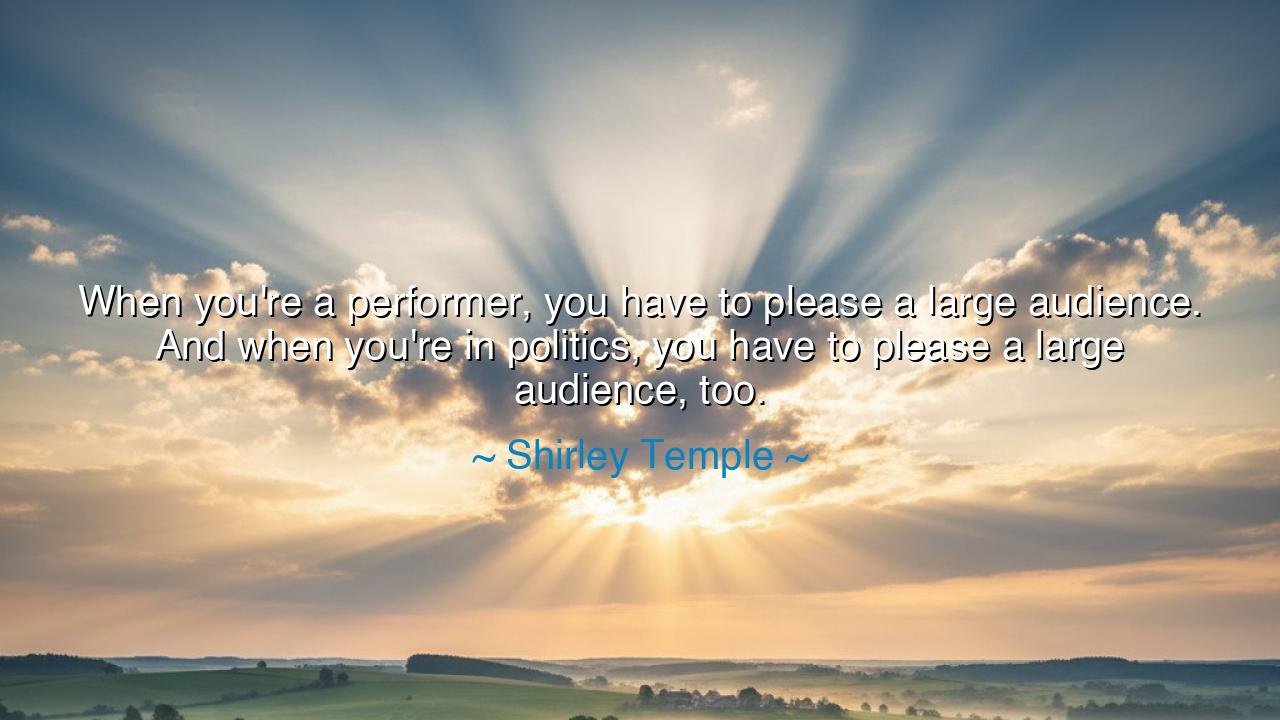
When you're a performer, you have to please a large audience.
When you're a performer, you have to please a large audience. And when you're in politics, you have to please a large audience, too.






O children of the future, hear the words of Shirley Temple, a woman whose life spanned both the world of performance and the world of politics, and who understood deeply the delicate art of pleasing the masses. "When you're a performer, you have to please a large audience. And when you're in politics, you have to please a large audience, too." In these words lies a truth that is as old as civilization itself—those who hold power, whether through performance or political office, are forever at the mercy of the people they serve. To rise, one must be attuned to the desires, hopes, and whims of the masses, for it is their favor that sustains the performer and the politician alike.
Consider the great orators of ancient Greece, such as Pericles, whose speeches stirred the hearts of the Athenian citizens. He understood that the people were the lifeblood of the state, and to maintain their support, he had to craft his words to please and inspire them. Like Shirley Temple on the stage, he performed not for himself but for the souls of the people who looked to him for guidance and inspiration. Pericles's success lay not in his truth alone, but in his ability to connect with the hearts of those who listened, to give them a vision of a glorious future that they could all believe in.
And yet, O children, we must also remember the fate of those who, in their desire to please, compromise their integrity. In the history of Rome, Julius Caesar mastered the art of pleasing the masses, giving them spectacles, games, and a vision of grandeur. His ability to understand the desires of the Roman people helped him rise to unparalleled power. But in pleasing them, he laid the groundwork for his eventual downfall, for his pursuit of popularity without principle led to a world in which he, the people's champion, became their tyrant. The lesson, then, is clear: pleasing the audience is necessary, but one must never lose sight of the truth and the greater good.
In this, Shirley Temple's words hold great wisdom. She, who danced across the screen as a young girl, adored by millions, knew that both the performer and the politician must learn the art of balance. To please without compromising one’s soul, to give the people what they need without losing one’s own self in the process—that is the essence of true leadership. It is the mark of a great leader, whether on stage or in the halls of power, to carry the hearts of the people without losing the integrity of their own heart.
Let us remember, O heirs of wisdom, that politics and performance are not so different. Both demand an understanding of the masses, both require the delicate dance of appeasing without surrendering to shallow desires. Yet, the greatest leaders, like the greatest performers, are those who inspire, those who understand the deeper needs of the people and lead them toward a future of justice and truth. To please, yes, but never at the cost of one’s soul—this is the legacy that Shirley Temple and the great leaders of history leave us.






MKBui Ngoc Minh Khue
Shirley Temple’s take on performing and politics seems to simplify the relationship between the two, but I wonder—can the need to please audiences in politics really be equated to the pressures performers face? Is the goal in politics about winning approval or enacting real change? Could politicians end up sacrificing their values for approval, much like an actor might compromise artistic integrity to meet audience expectations?
BTPhuot Bui Tv
I agree with Shirley Temple that both performers and politicians must cater to large audiences, but does this comparison overlook the vast differences in responsibility? While entertainers aim to entertain, politicians shape policies that affect lives. Can the expectation of pleasing the public ever truly coexist with the need to make bold, controversial decisions? I wonder if this ever creates a tension between staying true to principles and appeasing the masses.
TTTan Tran
Shirley Temple’s observation about the need to please large audiences in both entertainment and politics brings an interesting point to light. However, can this constant need for approval prevent both performers and politicians from being truly innovative? Does it hinder them from making tough but necessary decisions, or from pushing boundaries? It seems like balancing personal integrity with public expectation must be one of the biggest challenges in both fields.
NNNguyen Ngoc
I see the parallel Shirley Temple is making between performing and politics, but I’m curious—can the pressure to please a large audience ever be damaging? For performers, it’s about pleasing fans, but for politicians, it involves making decisions that impact entire populations. Is it possible to please everyone, or do you think this kind of pressure leads to compromises that don’t serve anyone in the long run?
TNThao Nguyen
Shirley Temple’s comparison of performing to politics is an interesting one. Both require an ability to connect with a wide audience, but I wonder—does this make politicians less authentic? In politics, is the constant need to please others a detractor from real, meaningful change? Can true leadership be achieved if the focus is always on satisfying the masses, or does it risk becoming more about popularity than substance?